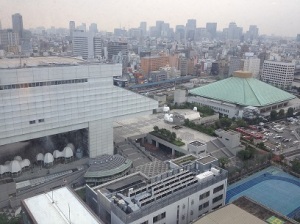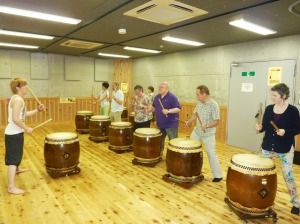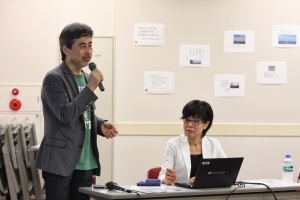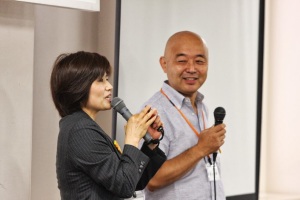J-SOL 6 report: Aoki, managers and workers from corporations lead the way with SF in Japan
 It hardly seems like five years since the first J-Sol conference – but it is! Jenny and I are back from a great week in Japan with Aoki-san and his team. This year the event was back in Tokyo (from Kyoto last year) and also back in the Dai-ichi Hotel Ryogoku, venue for J-SOL 3, next to the striking Edo-museum building (looking straight out of Thunderbirds) and the national Sumo stadium.
It hardly seems like five years since the first J-Sol conference – but it is! Jenny and I are back from a great week in Japan with Aoki-san and his team. This year the event was back in Tokyo (from Kyoto last year) and also back in the Dai-ichi Hotel Ryogoku, venue for J-SOL 3, next to the striking Edo-museum building (looking straight out of Thunderbirds) and the national Sumo stadium.
This year’s foreign guests were Ben Furman, and famous ‘£1 consultant ‘ Marco Ronzani and his partner Franziska von Blarer. Once again Ruiko Aoki had organised the most wonderful cultural introduction to Japan, so we were straight off the plane and into a tea ceremony hosted by lovely ladies (and one man) learning this tradition. It’s all about harmony and togetherness, and the precision and care of the hosts (not to mention their beautiful traditional costumes) were a great way to get the dust of the journey out of our hair. We then met for a meal of Japanese Wagyu beef – which really was the finest I’ve ever tasted, cooked in front of us on a teppenyaki grill. The chef even used the fat from the outside of the sirloin cuts to make fried rice for us to take home as a snack!
 Thursday started early with a ‘Japanese music experience’. Aoki’s administrator helper Satsuki Fujisawa is a keen player of the koto, a Japanese 13-stringed harp, and she had fixed up for us to attend a performance of modern tunes on the koto and shamisen, a three-stringed instrument played by professional musician Miho Todoroki. Not just that, but then more instruments appeared and we were coached to play an arrangement of the famous Japanese tune Sakura. It was a real treat to get up close with such beautiful instruments, and the performance was… well, you can see it on Facebook. Following a sushi lunch and pause for shopping, the musical theme continued with a session of
Thursday started early with a ‘Japanese music experience’. Aoki’s administrator helper Satsuki Fujisawa is a keen player of the koto, a Japanese 13-stringed harp, and she had fixed up for us to attend a performance of modern tunes on the koto and shamisen, a three-stringed instrument played by professional musician Miho Todoroki. Not just that, but then more instruments appeared and we were coached to play an arrangement of the famous Japanese tune Sakura. It was a real treat to get up close with such beautiful instruments, and the performance was… well, you can see it on Facebook. Following a sushi lunch and pause for shopping, the musical theme continued with a session of Taiko drumming – altogether a more physically demanding sport. Phew… But we were just starting, as after a delicious pub meal it was time for the karaoke-box, a private singing session with beer and fun.
Taiko drumming – altogether a more physically demanding sport. Phew… But we were just starting, as after a delicious pub meal it was time for the karaoke-box, a private singing session with beer and fun.
Friday was the pre-conference workshop day, with Ben doing his Kids Skills and Reteaming work and Marco presenting about ‘Ask don’t tell: how to initate SF organisational development’ and “Reaching the Tipping Point: How to spread solution focused organizational development in an organization”. Jenny and I chipped in with an evening on the MAGIC model of SF negotiation developed by our sfwork colleague Shakya Kumara, which drew a good crowd.
The conference itself ran over the weekend. A little like SOLWorld 2013, it was a little smaller than the previous year, but with excellent content. The theme of the event was ‘Roots and Diversity’ which allowed for an excellent selection of material. One thing I always notice about the Japanese events is that many of the participants, and indeed presenters, are managers and workers from organisations sharing their work, rather than the consultant and coaches who are more common at the international meetings. This year was no exception. The room was lined with poster in a “Wall Facebook”
an invitation for giving compliments and relation building messages, and we started with a “Gogen – Five Strength” activity used at the beginning to help people meet each other in their strengths. To get us off on the right foot  Ben led a keynote about ‘diverse uses of fantasy and imagination in SF work’. This is, of course, a great topic – SF combines almost forensic use of language to get details with creativity around Future Perfects and better days in the future. Ben used a nice move of having us answer some questions about successful pasts and strengths, privately, before moving into a pairs exercise, which seemed to me to work very well in setting the whole session up.
Ben led a keynote about ‘diverse uses of fantasy and imagination in SF work’. This is, of course, a great topic – SF combines almost forensic use of language to get details with creativity around Future Perfects and better days in the future. Ben used a nice move of having us answer some questions about successful pasts and strengths, privately, before moving into a pairs exercise, which seemed to me to work very well in setting the whole session up.
We then moved into workshops. The foreign contingent went to hear Saeko Katsukawa talk about her use of focused compliment sessions – ‘Compu-ru’ as they are known in Japanese – in the budget Italian restaurant chain Saizeriya (with over 1000 locations!). This had the effect of reinforcing good practice and learning, with excellent results. Just this one SF tool is used here in a creative way, which fits the context – exactly what good SF is about. Other workshops included the Zacros team showing how SF would support them for the next 100 years (yes, really… well, this is Japan). A full list of the workshops and presenters is at the bottom of this report.
The second session of workshops saw the Westerners taking centre stage. Ben did some live coaching, Jenny led on her ‘SF as a Copernican revolution’ article from EBTA 2012, Marco showed how conflicts could be a resource, and I engaged five brave souls without a translator for ‘let’s talk to Mark’ – which turned out to be about the roots of SF, how to use it to enhance the power of younger women in corporations, reflecting teams and much else, including contributions from Masahiko Yokota from Canon Inc. It’s very good indeed to see these leading companies getting into SF! And then, of course, the party and  cabaret, including a rendition and dance from a crazy ‘Watermelon Man’ (Aoki-san with headgear, of course).
cabaret, including a rendition and dance from a crazy ‘Watermelon Man’ (Aoki-san with headgear, of course).
Day 2 dawned with reflections and reviews, followed by another round of workshops.  I particularly enjoyed the story of Tetsutaro Tachika and his colleague Rie Asanuma from Texas Instruments Japan Ltd, about their growing use of SF. Tachika-san had been struggling with introducing SF for several years, and it was the arrival of Ms Asanuma which proved a catalyst in making some real progress. They both talked about how good it is to have a partner or collaborator to work with – again showing that ‘the action is in the interaction’.
I particularly enjoyed the story of Tetsutaro Tachika and his colleague Rie Asanuma from Texas Instruments Japan Ltd, about their growing use of SF. Tachika-san had been struggling with introducing SF for several years, and it was the arrival of Ms Asanuma which proved a catalyst in making some real progress. They both talked about how good it is to have a partner or collaborator to work with – again showing that ‘the action is in the interaction’.
The conference moved into Open Space mode led by Ruiko and J-SOL girl and stalwart Teruko Watanabe, This is a familiar process to anyone who’s been to an international SOLWorld meeting, with around 16 contributions from participants. This was really buzzing as ever! Finally the event closed with reflections, the passing over of the SOLWorld candle stick (to me, for transfer to the Summer retreat organisers), plans to meet next year for J-SOL 7 and then off to a final staff party to celebrate a successful event with the organising team. Aoki-san and his collaborators are still working away at SF in Japan, and the quality of the work emerging is e xcellent and novel – a remarkable feat. Kampai! (Cheers!…)
xcellent and novel – a remarkable feat. Kampai! (Cheers!…)
J-SOL 6 workshops and presenters:
1-A To develop and evolve a workplace community to enhance cooperation
Yumiko Morita (Consultant) / Yoshifumi Furukawa(SMBC Real Estate)
1-B SF Approaches for the NEXT 100 ~Significance of continuing our “SF inside” activities ~
ZACROS Dream Team (Fujimori Kogyo Company Inc.)
1-C Power of “Compu-Ru” to vitalize people and organizations ~Transition from “ to do Compu-Ru” to “to be Compu-Ru~
Saeko Katsukawa (Saizeriya Co.Ltd.)
1-D “Kata”(format) for experiencing an effective SF communication ~Let us simply experience what SF communication can offer~
Teruko Watanabe :Learning facilitator of SF Academia, ICF accredited Professional Coach
3-A “Hey, I just happened to get this one person on my side who resonates with SF, and just see so much is happening!” ~How I got a supporter and what became possible for me~
Tetsutaro Tachika / Rie Asanuma , Texas Instruments Japan Ltd.
3-B Organizational innovation driven by “Good & More” – A company that went almost bankruptcy became revitalized with SF way
Seiichi Imano, Human resource consultant, Manglobe Co., Ltd.
3-C “ Re-Teaming : Application in Japan and the Positive Results” ~Application of Re-Teaming to various cases including a sport team, factory employees, R& D team members, etc.~
Yumiko Kawanishi / Kaoru Yamakoshi EAP Souken, Randstad Japan, Inc.
3-D Solution Focus in a Japan Quality Award Winning Organisation ~Aiming to a Virtuous Spiral of management that satisfies people~
Taku Ogawa, General Affairs Manager, Kawagoe Gastroenterical Hospital
SF tip #1: How to use SF without being annoying/deluded/Pollyanna-ish?
We’re starting to publish monthly tips about using SF ideas at work. You can subscribe to get these by email using the sign-up box on the right. The first top is abvout using SF ideas in everyday conversation – without being annoying!
People who are learning SF are fascinated by the way in which the Solutions Focus tools help to shift the focus on a conversation quickly onto ‘what do we want’ and ‘what’s working’. As you’re starting to discover, this can quickly lead to more productive conversations, more engaged people and small steps to make progress right away.
Once upon a time (nearly 20 years ago now) I was learning SF for the first time and started to try to inject it into my beginner coaching work with managers. Time and again I would ask a ‘positive’ question like “When does the problem not happen?” or “When are things better than usual?” People would look at me like I was crazy, before continuing to tell me quite how severe the situation was! So, not the impact I was hoping for. I then figured out HOW to use these questions in ways which really made an impact.
Some of you may also be thinking “But won’t I just sound like a ludicrously positive person? Might I sound deluded? Or even start behaving like (dramatic pause) an… American?” The good news is that if you’re thinking like that, your are already showing good signs of the sensitivity needed to do SF really well. We want you to come across as skilful, caring and perceptive when you use OSKAR in action.
- 1. DON’T do it all the time. Wait for a challenging situation to come along – one that’s really worth your attention and effort.
- 2. Signal that you’re shifting into a coaching type conversation – say something like “So, it sounds like this is a tough situation… Would you like to take a few moments to think about it in a focused way to see if we can figure out what might help here?”
- 3. Start by asking the other person to summarise what they want – in a sentence – and then go from there, using whatever SF tools you like – a scale perhaps, a Future Perfect, or even what’s helping already.
This way you will be having a focused conversation, and will also have suggested to the other person / people that this is a special conversation which is worth giving attention and effort. The exception to this is Affirm – try slipping this in wherever you feel you can, and see what happens.
Please send in ideas for future tips – we’re very much up for suggestions and conversation. Email Mark McKergow himself at mark@sfwork.com.
Recent Comments